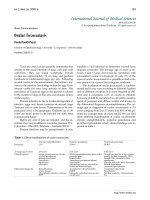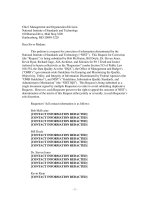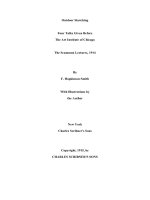elementary banking - american institute of banking
Bạn đang xem bản rút gọn của tài liệu. Xem và tải ngay bản đầy đủ của tài liệu tại đây (28.77 MB, 484 trang )
ELEMENTARY BANKING
American
Institute of
Banking
Section
American Bankers Association
Five Nassau
Street New York
City
Copyright
1922
by
American
Institute
of
Banking
GIFT
OF^
i^
„
•:»
*
•„^"
-
^
-»<
CONTENTS
CHAPTER
PAGE
I.
Elementary
Essentials
7
II.
Bank Departments
and Operations
35
III.
Deposits
and Checks
61
IV. Promissory
Notes
and
Discount
97
V.
Drafts and
Acceptances
127
VI.
Exchanges
and
Transfers
155
VII.
Bills
of
Lading and
Other
Documents 185
VIII.
Federal
Reserve
System.
211
IX.
Essentials
of Contracts
229
X.
Special Problems in
Law
255
XI.
Bank
Statements
281
XII.
Illustrative
Entries
309
XIII.
Bank
Ledgers
and
Department
Bookkeeping
375
XIV.
Accrued
Items
and
the
Audit
436
900737
PREFACE
THE
Institute
course
of study
in Elementary
Banking,
was
originally
adopted
in 1918.
Many
experienced
bank
clerks
had left
their
institutions and
entered
either
the
military
or
naval service.
Their
places
were
filled
by
young
men
and
women
with
little, if any,
business
training
or
ex-
perience. With
the
idea of
providing a
practical
and
logical
course
of
study
for
these
newcomers
in the
banking profession,
as
well
as a
foundation
for the Institute
Standard
courses
of
study,
a text-book
covering the
elements
of
banking
and law
seemed
to
be
desirable.
J.
F.
Ebersole of the
University of
Minnesota,
who
had
been teaching
an
elementary
banking
course
in Minneapolis
Chapter,
was selected to
prepare
such
a
book,
based
on
the
lectures given in
Minneapolis
Chapter.
That
book has been
a
distinct
success.
The
present text en-
titled
"Elementary
Banking" is
based
on the
book just
re-
ferred
to.
However,
the
original text
literature has been
completely
revised
and
brought to
date, in some
cases being
rewritten and
rearranged, and, in addition,
four chapters
on
bank
bookkeeping
and
accounting have
been
added.
Chapters
I,
II, III,
IV,
V, VI,
VII
and
VIII
have been
revised
by
James
B.
Birmingham,
Assistant Cashier of
the
National City
Bank of
New York
;
chapters
IX
and X
have been
revised
and
rearranged
by
Richard
W.
Hill, Member
of
the
New York
Bar
and
Secretary of the
American Institute of
Banking
;
and
chapters
XI,
XII,
XIII
and
XIV
were
prepared
by Arthur K.
Schulz
of
the
Chase
National
Bank of New
York.
John
M.
Chapman, Lecturer
on
Banking
in the School
of
Business of
Columbia
University, assisted
in
the necessary
rearrangement
of
the
text.
Thomas Ritchie, Comptroller,
and
Martin L.
L.
Henry,
Auditor,
both
of
the Chase
National
Bank
of New
York, were
generous
with
constructive
criticisms of
the ac-
counting
material.
INSTITUTE
PLATFORM
RESOLUTION
adopted
at the
New
Orleans
Convention
of the
American Institute
of
Banking, October
9,
1919:
"Ours is
an educational
association
organized
for
the
benefit
of the
banking fraternity
of
the
country
and
within
our
membership may
be found on
an equal
basis
both em-
ployees
and employers; and
in
full
appreciation of the
oppor-
tunities
which our
country and
its
established
institutions
afford, and
especially in
appreciation of the
fact
that the
pro-
fession
of banking affords
to
its
diligent and
loyal
members
especial
opportunities
for
promotion
to
official
and
managerial
positions, and that as
a
result of the
establishment and
main-
tenance
of
the
merit
system in
most
banks
a
large
number of
Institute members
have
through
individual application
achieved
marked
professional success,
we
at
all times and under
all
circumstances
stand
for the
merit system and
for the paying
of salaries
according to the
value
of
the
service
rendered.
"We
believe in the
equitable
cooperation of
employees
and
employers and
are
opposed
to
all attempts
to
limit indi-
vidual
initiative
and
curtail
production, and,
insofar
as our
profession is
concerned,
are
unalterably opposed
to
any plan
purporting
to
promote
the
material
welfare
of
our
members,
individually or collectively, on
any
other
basis
than
that
of
efficiency,
loyalty
and
unadulterated
Americanism."
A
successful
banker is
com-
posed of
about one-fifth accountant,
two-fifths
lawyer, three-fifths
polit-
ical economist, and
four
-
fifths
gentleman and scholar
—
total ten-
fifths
—double
size. Any smaller
person may be
a
pawnbroker or
a
promoter,
but not a
banker.
—
George
E. Allen.
Elementary
Barikiiig
CHAPTER I
Elementary
Essentials
THE
beginner in
a
bank usually
discovers
that
he
does not have
at his
command
a
sufficient
knowledge of
commercial
documents
and
banking
practice. Later
on, also, he
often
realizes
that he
did
not
start out with the best
principles
of
personal conduct
or
a
proper attitude or
view
of
his
own job.
It is the object
of
this
book to
help
the
beginner
to
acquire this
necessary
information at
the earliest
possible
moment.
He may
then become
a
very efficient
helper
within a short
time.
The
managers
of banks who
are
obliged to
train begin-
ners
find
this
to be a
problem of some
difficulty and
considerable
expense.
It has
been estimated that
the
training of the
average
beginner costs a
bank
about two
hundred
dollars
in
the
form
of
unearned
wages at
the
start, valuable
time consumed by the
officers
or men
in
the
bank
who
supervise
the
in-
struction
of
beginners, losses
through
errors
due
to
ignorance, and
waste
due
to
inefficient
utilization
of
time and
energy.
WHAT
IS
A
BANK?—
A
bank may be
defined
as a
credit
institution.
It
is
an institution
which
studies, deals
in and guarantees credit.
While
the
bank
receives
and pays out
large sums of
money
in
7
8
ELEMENTARY
BANKING
the
form of
deposits,
.such
operations
are
subordinate
to
the
one
great
fuiiction
—that
of
granting
credit.
If
we
view,
then,
the
bank
from
this
standpoint,
its
purpose
is
to facilitate
the
exchange
of
goods
with-
out the
use
of
money.
Banking
has been
developed
to
meet
the
needs
of
business.
Hence,
the more
highly
developed
business
becomes,
the
more
exten-
sively
bank
credit
is
used
and
the
more
important
banking
becomes
in
the
transaction
of
business
with
the
use of
a
minimum
amount
of
money.
THE
FUNCTIONS
OF
BANKING.
—
The
most
important
functions
of
banking
may
be classi-
fied
as
follows:
(1)
to
assemble
capital
and make
it
effective;
(2)
to
receive
deposits
and
make
collec-
tions;
(3)
to
check
out and
transfer
funds;
(4)
to
discount
or lend;
(5)
to
exercise
fiduciary
or
trust
powers;
(6)
to
issue circulating
notes. Every
bank
which
expects
to succeed
must first
of all
prove
its
value to
the
community.
The
services
which
a bank
performs
are
so generally
taken
for granted
that
the
public is
unaware
of
the real extent of
the facilities
offered.
Banks
are
equipped
to
utilize
funds,
for
either
a
short
or long
period
of
time,
safely, and with
some
profit.
Depositors individually
do not
enjoy
the
same ability. An
individual's
unused
funds are
perhaps
small in
amount, cannot be loaned
to
advan-
tage
with
the
assurance of immediate return when
desired,
and the
care
of the money involves worry
and
risk.
The bank, on
the
other hand,
possesses
the
necessary men,
machinery and
experience.
By
ob-
taining
deposits, each
perhaps
small in itself, from
ELEMENTARY BANKING
9
many
people,
it acquires
a large reservoir of
funds.
From
this
supply,
which
is
constantly
being
increased
by additional
deposits and
decreased
by withdrawals
according
to the
needs
and
circumstances
of
the de-
positors, the bank
can
now make loans
and other
investments
from
time
to
time.
It is
known
as
a
place where loans may
be
sought,
and it
is
protected
in making
these
loans
of funds
which
it has
had
left with
it on
deposit
by
the law of
averages
which
usually operates
in
such
a
way that withdrawals and
deposits
about
balance
each
other,
the normal ten-
dency being in
favor
of a
net increase.
By
receiving
deposits and
making
collections
the bank
saves
the
depositor much
personal effort.
To receive
or
deposit
in
one city
a check made
payable
in
another,
hundreds
or
thousands
of
miles
away,
to
convert
that check
in
a
relatively
short time into
cash available
for
the
depositor's
use,
and all this with no
direct assistance
from
the customer and at a
very
slight
expense
to
him or
no«e
at
all,
is
indeed service.
So
also is the
willingness
of the bank
to collect promissory notes,
drafts
and other
negotiable paper in
a
similar
way.
In
addition
to
taking care
of
funds without
charge
and
making
collections, the
bank provides
the
means
of withdrawing
and
transferring
funds
readily
by
giving
its customer a book
of
blank checks. If
a
depositor
owes
another
man one
hundred
dollars,
the
depositor need
not
go to
the bank, withdraw the
cash
and
pay
his debt. He can give
his
creditor
an
order
on the
bank, which can
be
presented at
the
bank in
person
and
the cash
obtained, or it
can
be
10
ELEMENTARY
BANKING
deposited
in
this or
another
bank. By
lending
money
the
bank
benefits
the
community
to
the extent
that it
supplies
funds
to
assist
worthy
business.
Temporary
working
capital
to
assist
in
the
commercial,
agricul-
tural
or
industrial
life
of a
community
is very
im-
portant.
Borrowers
logically
look
to
a bank for
such
assistance
and
are thereby
saved
the necessity
of
either going
without
the funds
they need
or
spending
an
endless
amount
of
time
and
effort
in negotiating
many
small loans from
individuals.
Note
issue,
orig-
inally
a
common
right
of a bank,
is
now
restricted
by
law
to National
banks,
Federal Reserve
banks and
the
Government,
and
is
chiefly valuable
as
a
means of
putting additional currency
in
circulation according
to the needs
of
trade.
There has been
such
an
enor-
mous
growth
in
the business
done
by trust
companies
and
by
trust
departments of banks
in
the last few
years
by
acting
in
various fiduciary
capacities
that
it
seems
necessary
to
include
this as one of the
im-
portant
banking functions, which
will
be more
fully
discussed a
little
later.
TYPES OF
BANKING.—
According to their
functions, banks
may be
classified
into four
chief
types,
namely,
commercial,
savings,
trust,
and invest-
ment. The deposits
of
commercial
banks
are re-
ceived
largely from
individuals,
firms and
corpora-
tions
in
all
lines
of business,
are
repayable
on
demand,
and
are
mostly
invested
in short
time loans
for
com-
mercial
business
purposes,
these
loans
having a
ma-
turity
of
perhaps
three to
six
months,
and
enabling
the
bank
to
keep
its
assets
comparatively
liquid
and
ELEMENTARY
BANKING
11
its loans
constantly
maturing.
Savings banks,
which
are
designed to
promote thrift,
receive unused, small
sums
from
the
general
public,
which are
left with
the
banks
for future
need.
These
deposits
may be repaid
on
demand,
but since interest is
usually paid on de-
posits, and
the bank's
investments are
made for
a
long
period of time to enable it
to
earn
a
higher in-
terest rate,
the
banks are
generally allowed
to
de-
mand advance
notice of
anywhere
from
ten
to
ninety
days of any
substantial
sums to
be
withdrawn. This
notice of
withdrawal
may
be
waived
by
the bank if
it
so
desires. The
bank may
also further
protect
itself
against
large
withdrawals
by
limiting
the
amount
which it
will receive on deposit from
any
one person.
The
chief
investments
of savings banks
are approved
bonds
and
first mortgages on real
estate,
both probably
of
long
maturity. The deposits
classified
as
trust funds are
received
from
individuals,
firms
and
corporations
assigning
funds for some trust
function, and
are
repayable and
invested
according
to
law
and
the
conditions of
the
trust. Investment banks
receive
their
deposits
from well-to-do
people who
wish
their
funds
held for
investment and which are
in
due
course
converted into bonds, acceptances
and
other so-called investment securities.
A
particular
bank
may perform functions
of
more
than one
type
of
banking
as
the
recent tendency
in
bank-
ing
is
towards an
ever
greater
scope
of business,
partly caused by competition and partly
by
the
natural
desire
of
a
bank
to
handle
all of the
business
of
its customers
which
it
readily can.
12
ELEMENTARY
BANKING
KINDS OF
BANKS.—
The kind
of
bank which
will
be
formed in any
community
is largely
deter-
mined
by the needs
of that
community.
Under the
general types
just
discussed
we find
the following
classifications
:
National,
State and private
banks,
and
the banking
departments
of
some
trust
companies
which perform
the functions
of a commercial bank.
In addition,
a
private bank
usually
does
either an
investment or
a
savings
business.
Savings
banks
are
either
mutual
or stock
or perhaps
but
a depart-
ment of a commercial bank.
Many banks perform
trust
functions, although
originally
this work was
monopolized among banks by trust
companies
incor-
porated for
that
express
purpose; today we
find
National and
State
banks also acting
in
fiduciary
capacities.
Many houses call
themselves
investment
bankers,
principally
dealers
in bonds,
mortgages,
and
acceptances and
the bond
departments
of banks
and
trust
companies.
INSTRUMENTS
OF
BANKING.—The
prin-
cipal
instruments of
banking are
(1)
money
and
currency,
(2)
checks,
(3)
bills of
exchange
or
drafts,
(4)
acceptances,
(5)
promissory
notes.
A "check"
may
be
defined
as
a
written
order
on a
bank
or
banker
for
the
payment of
money.
A
*'bill
of
exchange"
or
"draft"
may be
defined as
an
order
drawn by
one
party,
called
the
"drawer,"
on
another
party,
called
the
"drawee,"
for the
payment
of
money to
a
third
party,
called
the
"payee,"
the
amount to
be
charged
to
the
drawer.
A bill of
exchange
may
be
drawn
payable
at
sight or at
some
specified
time
subsequent
ELEMENTARY
BANKING
13
to
sight or demand. Unless
the
drawee
wishes
to pay
a
time draft or
bill when presented before
it is due,
he writes
across the
face of the
paper
the
word
"accepted/'
with his
signature and
the
date.
This
means that
the
drawee assents to the
terms
of
the
bill
or
draft and
binds
himself
to
honor it
at
maturity.
It
then becomes
known
as
an "acceptance."
A
"promissory note"
is
a
promise made
in writing by
one party,
called
the
"maker," to
pay
a
sum
of
money
to
another party, called the
"payee," or to
his order.
BANK ORGANIZATION.
—
Banking
laws
in
the
United
States, both
National
and
State,
have
become
crystallized
into concrete
form, and
in
the
organization of any banking
corporation
certain
legal requirements are
prescribed
by
governmental
authorities. Under
the
National
Bank Act there
is
practically
but
one
form
of
charter under
which
all
National banks are
organized.
They
are subject
to
Federal supervision and
examination
and
their
chief
functions are
those
of a
commercial bank,
customarily
called deposit and
discount.
In addition, a
National
bank
has
the
right
to
issue
circulating notes
(cur-
rency)
up
to
the amount
of
its capital stock,
secured
by an equivalent
amount
of U. S.
Government pre-
war
bonds.
Many
National
banks also
operate
sav-
ings departments
which are
sometimes
called
thrift
or
interest
departments
to
avoid
a
conflict
with
State
laws
limiting
the
use of
the
word
"savings" to
State
institutions
organized
specifically for
that
purpose.
While
National banks
are
not under
State
super-
14
ELEMENTARY
BANKING
vision,
they are governed
by the
laws
of
the
State
in
which
they
are
located
in
some
few
important
mat-
ters
such as legal
holidays
and
interest
rates.
The
laws
of the different
States
provide
for
State banks
of deposit
and
discount,
loan
and
trust companies
and
savings
banks.
State banks,
so-called,
are
usually
commercial
banks
of
deposit
and
discount
and
very
closely
resemble
National
banks
except
that they
generally
have
a greater
latitude
in
the ways
in which
they may
lend
money
and
in
the
amount they may
lend
to one
borrower. A
State
bank
which joins
the
Federal
Reserve
System
has to
conform very
closely
to the same rules
that govern National banks.
No
bank
organized
under
State laws issues
currency.
A
State bank
may
by
its title show that it is intended to
perform
various functions. It may be a savings
and
loan company,
a trust
and savings bank, etc. What-
ever its function, it
is
organized
under
the
laws
of
the
State
and is
subject to
the
supervision
of and
exam-
ination
by
the State
banking
authorities.
In
a
re-
stricted sense
building and
loan associations
also do
a
banking business
and may be
incorporated
under
State
law. Trust
companies
are
organized
primarily
for
the purpose
of
holding
and
administering
trusts
of various
kinds.
In this
capacity
trust
companies
may act
for
both
individuals
and
corporations
in
the
following
capacities:
A.
Individual
—
(1)
executor of
wills,
(2)
administrator
of
estates,
(3)
trustee
under
agreement,
will
or deed
of trust,
(4)
guardian of
minors
and
incompetents,
(5)
conservator
or com-
mittee
of
incompetents,
(6)
agent of
individuals.
B.
ELEMENTARY
BANKING
15
Corporate
—
(1)
transfer
agent and registrar,
(2)
fiscal
agent,
(3)
trustee
under
mortgage,
(4)
as-
signee and receiver
of
bankrupts (individuals
or
cor-
porations),
(5)
guarantor
of titles,
(6)
treasurer.
The
great growth
of trust companies
and
trust
de-
partments
may
be attributed
chiefly
to the fact that
they have
perpetual
existence,
are always available
during
banking
hours,
are proficient and
efficient,
show no favoritism,
operate
economically,
and have
a
record of
100%
honesty in
handling
trust funds
from
their
inception
to date.
Many
trust
companies
are divided
into
two principal
departments, the trust
department
which
has
just
been described
and a
bank-
ing
department
which
is
almost
identical
in
functions
with
a State bank of
deposit and discount. National
banks
in
many
cases
obtain permission from
the
Fed-
eral
Reserve
Board
to act
in
various
trust
capacities,
and in
some
States the so-called
State
banks may also
be granted
these
powers. Savings
banks are
of
two
kinds
—
^mutual
and
stock. The
former
have
no stock-
holders,
are
governed
by
a
philanthropic
and self-
perpetuating
board
of trustees, and
pay
the earnings
of
the
bank
to
the
depositors
as interest.
Stock sav-
ings
banks
pay an agreed
rate of interest and dis-
tribute
the profits
to
the stockholders
as
in any
com-
mercial
bank.
The bank is managed by directors
elected
by
the
stockholders. Mutual savings
banks
are
found
more
frequently
in
the Eastern
and
At-
lantic
States. In
many
States, especially
in the
West
and
South,
stock savings banks
enjoy functions
similar
to
those of
State
banks
of deposit and
dis-
16
ELEMENTARY
BANKING
count,
and
frequently
State
banks and
trust com-
panies, not especially
organized
for
the purpose,
endeavor
to
obtain
savings
deposits.
BANK
ADMINISTRATION.—
Banks
are gov-
erned
by boards of directors
elected
by
the stock-
holders.
By
law,
the directors are
primarily
re-
sponsible
for the administration of the bank.
Bank
officers
are chosen
by
the
directors
and are
charged
with
the
duties and
responsibilities of active
admin-
istration.
The
size
of
the
bank,
its
location
and
the
amount of
business
done
determine the
number
of
officers, although in
every
bank there are
at
least two,
namely,
a president
and a cashier. In larger banks
there
is also
a
vice-president and, sometimes,
an
assistant
cashier. In
the great
city banks
there
are
frequently
two
or more
vice-presidents and assistant
cashiers. In the
administration
of
the affairs of any
bank
the duties and
responsibilities
of every
officer
and
employee
should
be
well defined.
Responsibility
is
commensurate with authority,
and officers and
employees should be held to
strict accountability for
the satisfactory
performance of
their
own
specific
duties
—
no
more, no
less.
Those
who do
more than
their
duty are
in
a class
by
themselves.
Ambition
to do
better and
greater
things,
however,
must
not
lead
to
the
mistake of
neglecting routine work.
Banking is a
business
of
infinite
detail, and accuracy
and
promptness
in
minor matters are essential
to
any
complete
and
logical system of
administration.
ROUTINE
WORK.—
The
banker
who
begins at
the
bottom
—and
that
is where every banker
should
ELEMENTARY BANKING
17
o
g
w
^
^
o
o
O
&
§
^
;S
g
S
r
"*
^
o
t3
pq
S
^
>
^tiS
^
f^'SSFP
H
si's
s
E
2
(^ ^ss?s
g
g'-slSS
^
-^
So:
-s
^
-§
?
i
I
u
s
«
s
^^
M P
Din
CO
^
pH
H
M rt CO
W
O
O
^
W
O
*^^ia
^
;uioddv
to
Xoiduia
^
clj
i-h to
J
ra
Q O
5
18
ELEMENTARY
BANKING
begin,
whether
his
social
position
is
at
the
beginning
or
the
end
of an
ancestral
line
—
should
systematize
routine work
into
habit,
thereby
simplifying
physical
movements,
diminishing
fatigue
and
assuring
speed
and
accuracy.
Uniform
and
continued
practice
will
create
well-beaten
channels
of
thought,
so that a
minimum
of
mental
suggestion will
cause
the auto-
matic
performance
of a
mountain
of
detail, with the
nervous
system
as
an
ally
and
not an enemy. The
only danger
in
thus
maximizing
the physical
and
min-
imizing
the
mental
is
that intellectuality
may
some-
times become
obscure.
The
beginner in banking
should
master routine,
but
should not let
routine
master him.
In
accordance
with
such
concep-
tion
of
routine work, every bank man, no
matter
what his position,
will find
it
convenient occasionally
to use
the adding machine. The messengers in
preparing
their
own runs,
and
in helping with
the
morning
work in the
mail or
transit
depart-
ment,
will find
it
indispensable to
run an
add-
ing machine
with rapidity and
accuracy.
In
order
to
secure
this rapidity
with accuracy,
beginners should
learn
the
right method
of
running
such
machines from
the
very
start of
their
training.
MESSENGERS
AND
OTHER
BANK MEN.
—This
book
will
refer
to
the
beginner
as
a
"messen-
ger."
All bank
employees
are not
messengers, but
the
duties
and
responsibilities
of
the
messenger
are
such
that
all
bank
men
will do
well to
study
the
work
of
such
beginners
and to
learn of
their
problems.
The
lack
of
one
simple fact
may
influence
an
important
ELEMENTARY
BANKING
19
decision. The elements
of bank
administration are
therefore worth
most
careful
study. It
should be con-
sidered
a
great advantage
to
begin
at the
bottom
in
the
banking
business. It
is only
by
beginning
at the
bottom that a
man
can become
familiar with all the
details
of
the business. And later, when
he becomes
a department head
or
officer,
the
man who has begun
at the
bottom
will understand his duties better
and
will
know what
to
expect of other
men. The mes-
sengership
is
a
golden opportunity to
learn
of
modern
business
by
observing
local business
practices, docu-
ments and men. This
is a
privilege
that
may be
en-
joyed only in
the duties
of a
messenger unless
one
later
becomes a part
of
the
credit
department.
NEEDS OF THE
BEGINNER.—
There are three
important
things which
the
messenger
should
acquire
during his first week in the bank.
These are
(1)
a
desire
to
make the business men of the
city
like
his
bank;
(2)
a
desire
to
secure
merited personal
advance-
ment in his
own bank;
(3)
a
certain amount
of
defi-
nite information concerning
adding
machines and
the
duties
of messengers on
routes.
HOW
MAY
A MESSENGER
INFLUENCE
BUSINESS MEN?—Messengers
have
an
important
influence on
the
ideas
of
business
men
concerning
particular banks.
Many people judge
a
bank
by
its
messengers
because
they
see
the
messengers
often
and may never actually come to
the bank
to see
any
one else. While the officers
often
meet the
public
in
the making of loans
and the
transacting
of
other busi-
ness, yet the
messengers
are
very important
from
the
20
ELEMENTARY
BANKING
standpoint
of
appearances,
for
they assist
in
collecting
the
obligations
due to a bank.
It
is equally
as
impor-
tant to make
a
good
impression when
collecting
as
when lending.
Personal
cleanliness
is the
first essen-
tial
in
making
a good
impression.
Customers con-
sider
smoking
as questionable in
a young man. Even
the officers who
smoke
usually prefer
the young man
who
does not smoke.
As
the
personal
representatives
of
the
bank,
therefore,
messengers
should
consider
their
own
personal appearance
equally as important
as the personal
appearance of
an officer.
The
second
essential
is
courtesy and politeness.
The essence
of
courtesy is
to
treat
every
individual
with
equal kindness
and
consideration. What may
appear to a messenger
to be
a
very
insignificant trans-
action
with
a
very insignificant
individual may, as
a
matter of fact, influence a very large
transaction
for
or against
his own bank.
So
much of
modern busi-
ness
is carried
on
over
the
telephone that
the
custom-
ers of a
bank may
very easily
form
their opinion
of
the bank
from
the
way
in
which
they are
treated
in
a
telephone
conversation.
The fact
that
the person
with
whom
you
are talking
over
the
telephone cannot
see your face
makes
it
especially
important
that
your
words be
selected
carefully and
that
your
general
atti-
tude be that of
persuasive
kindliness.
No one
should
attempt to
telephone
concerning
important
business
matters
without
planning
carefully
in
advance
what
he
is
going
to say.
A
third
essential is
never
to
give
out
any
informa-
tion
concerning
the
affairs of the
bank.
Business
men
ELEMENTARY
BANKING
21
do
not like
to
have their
affairs
known
in great
detail
by
their
competitors or
by
other business men. The
customer's relation
with
his
bank
is
one
of
great
con-
fidence, similar
to
his
relationship
with his
doctor
or
his
lawyer.
The men who
represent
banks must
therefore
be always
on their guard
to
avoid
giving
confidential
information into
the hands
of persons
who
should not
receive it. Never
answer
a
question
concerning
another
business man's affairs which have
been handled
through your
bank.
Do
not boast,
either
upon the street
or at your
home, concerning
any transaction
which
you may have handled. Con-
sider
yourself the confidential
trustee of
the bank's
information. Nothing will
drive away
a
customer
so
quickly
as
to
find
out
that he
can
secure
information
concerning
others, because
he
will
then
suspect that
others
can
secure
information concerning him.
HOW
MAY BANK
MESSENGERS
SECURE
PERSONAL
ADVANCEMENT?—
Employees
who
are
working for banks
are
being watched every
day
to see
if they
are
going
to
develop into
men
of
char-
acter and capacity.
Every
day's task is made the
basis for
judging the
individual.
Every
day is a judg-
ment
day.
Managers of
banks see
what takes place
but
seldom
remark
about
it.
The beginner in
banking
must
not make the
mistake
of believing
that
his
work
is
unimportant. It
is
well that
a
messenger
be
re-
minded of the fact
that the
banks
in
many large cities
use
old
men for
messengers, and that
in
country
banks
it is often the
president
or cashier who performs such
work.
The
importance of
the
work
must
not
be
22
ELEMENTARY
BANKING
judged
by the
amount
of
the
salary.
The
salary is
small
because
the beginner
knows
so little
about his
work.
As
soon
as
he
is
prepared
for
advancement his
salary is
increased.
The
individual
who
deserves and
secures
advancement
must
meet many
requirements,
but
the
more
important
are (a)
honesty,
(b) team
play,
and
(c) development
of
individual
capacity.
SPECIAL
INSTRUCTIONS
FOR MESSEN-
GERS AND
COLLECTORS.—
(1)
The head
mes-
senger
will make
a daily schedule
for reporting each
morning
for
work, lunch
hour,
etc.
When
the mes-
sengers are
not
out
on
trips
they
will
be
assigned to
other work.
Messengers must report
immediately
to the
head
messenger
upon
return from routes. If
unable
to
report for work,
telephone
the
chief clerk
not later than the time
you
customarily
arrive. If
late,
notify
the
head messenger upon
arrival,
so
that
you
will
not be
reported as
being
absent.
(2)
The
routes
and times, of
course, vary
in different cities.
Messengers must
be sure that
everything carried
by
them
on their
routes has
been
turned
in
be-
fore
leaving at
night,
and must
check
up
with
the
head
messenger.
Be
sure
that your
wallet is
sup-
plied at
all times
with "notices,"
"dishonored check
receipts," "cash
envelopes"
and
"collection
paid
stamp."
It
is
very
important
that
you
keep the
date
correct
on
your
collection
paid stamp.
If the
docu-
ments
which
you
have
stamped
should
be
needed as
proof
in court,
the
exact
date
will
be
very
necessary.
The
wallet
should
always be
carried,
and
carried
inconspicuously,
even
if it
contains but
one
item.
ELEMENTARY BANKING
23
Keep
your hand on
the wallet and then
no one will
be able
to take it away from
you
without
your
know-
ing
it.
(3)
Before
starting on
your
trip,
be sure
that
you have
located
with
accuracy all
of
the parties for
whom
you
have
documents.
When
you
have
a
large
number
for
one
building, ride
up
in
the
elevator
and
present
the
documents from office
to office
as you
run
down
from the
top
floor
to
the
bottom.
(4)
On entering
an
office
for
the
purpose
of
making
presentation
of
collections,
etc.,
always bear
in
mind
that
you
are
a representative
of
your
bank,
and
that
your
institution
is
constantly endeavoring
to
obtain
new customers, and
at the same time please
all with whom the bank
does business.
(5)
Present all paper promptly.
Drafts for
ac-
ceptance
or payment should always
be
presented
to
the drawee
in
person, and the collector should
make
every
effort
to
find him. In
case the drawee
is
absent
a presentation of the draft at his place of business
and
the leaving of a
notice may
be
sufficient,
but
when-
ever
possible
see
the drawee
in
person.
(6)
Present
all
firm
or corporation
documents
at
the
cashier's
office of the
concern,
and
be
careful
to
distinguish between
documents which
are
obliga-
tions of
the
firm and
others that
are
personal obliga-
tions of
its
officers or
employees.
(7)
If the
document is refused payment
or
ac-
ceptance,
the collector
should try
to
get
the interested
party to
write his reason on the back of
the
document
itself and
never
on any
papers
which
are attached to
24 ELEMENTARY
BANKING
it. In
the event
of
his
refusing
to do so
the
collector
should himself
make
the notation. No document
should
be
returned
to
the collection teller without
some
notation
of reasons. In
the
case
of
handling
returned checks,
notations
should
be
made on the
back of the "return slip''
which
is attached
to
the
face
of the check. These
rules are
of importance and
should
be
followed for perfect work.
(8)
In the
case of
non-payment or non-accept-
ance,
leave
plain and legible "notices,"
in
all
cases.
Remember
that the
"notice"
is
left
to
safeguard
your
bank from a lawsuit for
not
having
presented the
paper.
The
notice
is proof of presentation.
If
en-
trance to
office
or residence
of
drawee is locked,
the
notice
may be left
in
the
drawee's
box
or
under
the
door.
(9)
When a time
draft
is
presented
for
accept-
ance,
be
sure
that the
party
who
accepts the
same
has
the
proper
authority to do so.
Acceptance should
be
signed as
follows
:
When drawn
on a
partnership,
it
must
be
signed
in
the
partnership name
with
the
name of
the
partner
signing it; if a
corporation, it
must
be
signed
in
the
corporation
name
with the
name
of
the
official
signing it,
who must
show
his
title
after his
name.
(10)
Always
remember
either to
get
payment
or
bring
back
the
item itself.
Never
leave
an unpaid
draft
or
note
without first
calling
up
the city collec-
tion
department,
draft
teller or
head
messenger.
Messengers
should
never
intimate
that they
are tired
of
bringing
the
same
collection
over
and
over
again
ELEMENTARY
BANKING
25
without
results. The teller should,
however, not
al-
low collections
to drag
along
too
long,
and after an
item has
been
presented
a
certain number of times
it
is
well
to attach
a
notation saying
that if
such
item
is not
paid
"we
will
be
obliged
to return it
to the
source
from
which we
received
it/* When
you
have
for collection two
or
more
drafts
on one
party
who
pays by
one check,
the amounts of
the
drafts
that
are
paid
must be listed
on
the back of the check.
This
facilitates tracing and checking
up.
(11)
Drafts are frequently paid by
persons other
than those on whom
the same are drawn,
but
great
care should
be
exercised in
such cases
in
order
to
avoid
liability for
loss
occurring to the rightful owner
of
goods released
as
collateral. Be
sure to
write on the
back of the check
the
name of
the
party
on
whom the
draft
was
drawn.
When
you
are presenting
a
draft
for
payment,
never allow
anybody
to take
up
and
keep
a bill
of
lading
or
other
papers unless they pay the
draft.
When documents
are
attached
to drafts
pre-
sented
for payment, observe closely the number of
bills
of lading
and
other documents, and
be
sure
that
the same
number and
kinds
are
returned
to you
if
the
draft
is not paid. Do not
permit
a
change
to be
made
in
the wording or
meaning
of
any paper.
(12)
Messengers may
know which
items
are
handled
as
cash
and
which
are
ordinary collections,
but
they
should
endeavor to
get
each paid.
A
messen-
ger should
never try
to
answer
questions
regarding
matters
with
which
he
is not
familiar. Any
time
such
questions
may be
asked,
promptly
call the
collection









